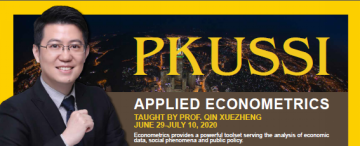PKU-UChicago International Policy Action Lab (IPAL)
July 6-July 26, 2020 Online
Learn from leading scholars and build data analytics skills in three weeks. Take advantage of UChicago and Peking University academic and career resources virtually from anywhere in the world.

ABOUT IPAL
Through the flexible model delivered by the PKU-UChicago International Policy Action Lab, you’ll learn the evidence-based approach of conducting international policy research from top scholars at Peking University and the University of Chicago.
As a participant, you will:
•Gain rigorous, interdisciplinary training on data analysis and international policy research
•Work with top faculty members from Peking University and the University of Chicago
•Complete an individual policy research capstone project
Curriculum
Peking University Applied Econometrics Pre-program Module (Optional)
Before the program begins, June 29 - July 10, IPAL participants will have free access to the optional pre-program module to learn applied econometrics skills taught by Peking University.

Programming in R Prerequisite Course (Optional)
Basic knowledge of statistics is a prerequisite to participate in the IPAL program. Participants must complete a self-paced online course in R programming between June 22 and July 5, 2020.
Designed for students with little or no coding experience, this course introduces you to the tools required to write and share code; translate self-contained questions into R programs; and learn how to retrieve, clean, visualize, and analyze data.
Week 1: Introduction to Programming in R
Live TA sessions will be conducted during program orientation week, July 6 - 12.
Week 2: Policy Analysis and Causal Inferences
During week 2, July 13 - 19, you will learn econometrics methodology and skills led by Peking University. This course will provide you with a comprehensive understanding of the econometric modeling tools that are frequently used in empirical economic research. You will access and watch about 20 hours of lecture videos and participate in 10 hours of live sessions with faculty and teaching assistants.
Week 3: Faculty-led Capstone Project
During week 3, July 20 - 26, you will analyze real datasets and research on an international policy topic led by the University of Chicago.
You will work in small groups led by faculty director Austin Wright on a capstone project, conducting a comprehensive policy analysis using real datasets. The project enables you to work through real world problems and collaborate with peers and faculty to design a solution.
Past capstone projects include:
•Conflict and Insurgent Learning: How do insurgents learn and adapt to their enemies?
•Cyber Attacks and Stock Market Prices: Do company strategically decide on the timing to release the hack news?
•Hate Crimes in the United States:
What are the trends and implications of hate crime reporting?



“The capstone project is an opportunity for students to take the skills that they have acquired from the program and start to think about: ‘How do I ask and answer a really important research question rigorously?’”
Austin Wright, Assistant Professor, Harris Public Policy, The University of Chicago
IMPORTANT DATES
Early Bird: April 15-May 1, 2020
Application: April 15-June 1, 2020
Optional Courses:
Programming in R prerequisite: June 22 – July 5
Applied Econometrics (with Peking University): June 29-July 10
Required Program:
Orientation Week & Live TA sessions for R: July 6-12
Policy Analysis and Causal Inferences: July 13-19
Faculty-led Capstone Project: July 20-26
Fees
Program Fee: $2,300 (300$ discount for applications before May 1, 2020)
Enrollment Deposit: $500 (required for admitted students to secure their seat)
Faculty
Xuezheng Qin

Xuezheng Qin is a professor and deputy dean in the School of Economics at Peking University, and the director of the Peking University Research Center for Market Economy. Dr. Qin’s primary research interests include health economics, economics of human capital, and applied econometrics.
Junjian Yi

Junjian Yi is an assistant professor at the National University of Singapore and guest faculty at School of Economics, Peking University. His research focuses on medical and health economics, labor and demographic economics, economics of human capital, and applied econometrics.
Austin L. Wright

Austin L. Wright is an assistant professor at the University of Chicago Harris School of Public Policy. His research leverages micro-level data to study the political economy of conflict and crime in Afghanistan, Colombia, Indonesia, and Iraq. His work is supported by the National Science Foundation, Niehaus Center for Global Governance, The Asia Foundation, and World Bank.
For more information
For more information on the program, please follow this link:
https://harris.uchicago.edu/IPAL
If you have any questions, please feel free to write to this email:
ipal@uchicago.edu
Source: Office of International Relations, PKU